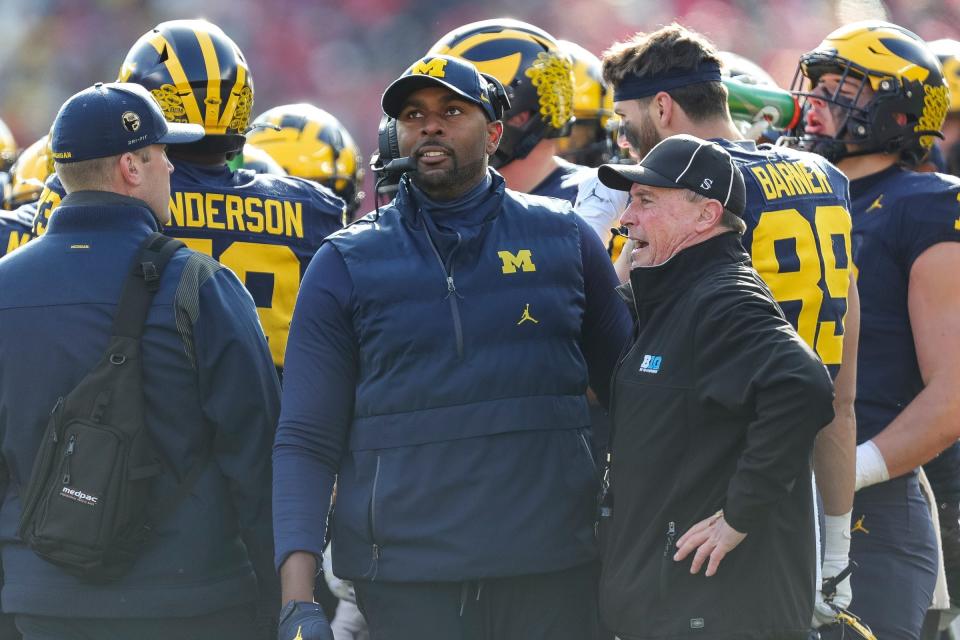NCAA sanctions Michigan with probation and recruiting penalties for football violations
Michigan has been placed on probation for the next three years and will face other penalties from the NCAA due to violations during a COVID-19 dead period and for having non-coaching staff members participate in impermissible roles under former football coach Jim Harbaugh.
The penalties, which also include a fine for Michigan and recruiting penalties, were part of a deal between the NCAA enforcement staff, the University of Michigan, and "five individuals who currently or previously worked for its football program."
According to the release from the NCAA, one former coach did not participate in the agreement, and "that portion of the case will be considered separately by the Committee on Infractions." The coach who did not participate is not named by the NCAA.

Harbaugh served a self-imposed three-game suspension at the start of the 2023 season because of these violations,, which are separate from the sign-stealing saga involving Connor Stalions, which broke in the second half of the year.
“Today’s joint resolution pertains to the University of Michigan Athletic Department and several former and current employees," Michigan athletic director Warde Manuel said in a statement. "We are pleased to reach a resolution on this matter so that our student-athletes and our football program can move forward. We have no additional information and cannot comment further on other aspects of the NCAA’s inquiries.”
Michigan appeared to have a resolution in place with the NCAA last summer that would’ve suspended Harbaugh for four games, along with new head coach Sherrone Moore and new offensive line coach Grant Newsome for one game, but the deal fell apart in August just before the 2023 season.
Michigan first received a draft notice of allegations related to recruiting violations and coaching activities by noncoaching staff members in January 2023. The violations included in-person recruiting contacts and tryouts during the NCAA-mandated COVID-19 dead period and exceeding the number of allowed coaches participating in both “on- and off-field coaching activities”, according to the NCAA.
The violations were labeled as Level II violations which are defined as actions deemed “more than a minimal but less than a substantial or extensive recruiting, competitive or other advantage” according to a description adopted in 2019.
An additional Level I violation was brought against Harbaugh, who told the NCAA he had no recollection of the Level II violations, which the NCAA determined as misleading. A Level I violation is defined as a “severe breach of conduct” that “seriously undermine or threaten the integrity of college sports,”.
When the official notice of allegations was sent in December, just ahead of the Wolverines’ third consecutive trip to the College Football Playoff, multiple people told the Free Press Michigan acknowledged the Level II violations while Harbaugh maintained his innocence in the Level I violation.
The Wolverines won the first three games of the season without Harbaugh, who then returned for the next six games before being suspended again by the Big Ten for a different scandal, causing him to miss the final three games of the regular season.
Big Ten commissioner Tony Pettiti handed down the second suspension after Michigan’s alleged sign-stealing operation became public in late October. Shortly after the news became public, Stalions was identified as the ringleader, where he would allegedly purchase tickets to games of future Michigan opponents, send associates to attend games and film the opponent's signals on the sideline that weren't available on television.
Harbaugh and Michigan initially filed a court order seeking to stop the three-game suspension from the Big Ten, but dropped the case before it was scheduled to hit court and accepted the suspension, which was handed down to Harbaugh for violating the conference’s sportsmanship policy.
Harbaugh returned for the postseason, where he led Michigan to another Big Ten Championship and the school's first national title since 1997.
In response to Tuesday's news, Harbaugh's lawyer Tom Mars told the Free Press via a text message he submitted a response on behalf of the former Michigan coach, but that ended Harbaugh's involvement.
"I filed a lengthy response to the NOA on behalf of Coach Harbaugh, which unfortunately hasn’t been made public and will probably never see the light of day," Mars said. "That concluded Coach Harbaugh’s participation in the case."
Since winning the national championship over Washington, Harbaugh has left the Michigan program to take the head coaching gig with the Los Angeles Chargers. Moore, who was interim coach during a November suspension of Harbaugh was promoted to head coach after the season.
Harbaugh's move also spurred a wave of staff turnover, including defensive coordinator Jesse Minter joining Harbaugh, among others.
This article originally appeared on Detroit Free Press: Michigan gets NCAA sanctions including probation, recruiting penalties

